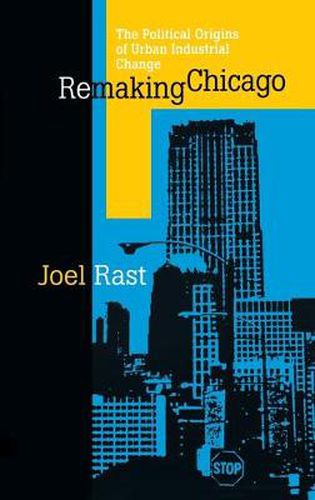Readings Newsletter
Become a Readings Member to make your shopping experience even easier.
Sign in or sign up for free!
You’re not far away from qualifying for FREE standard shipping within Australia
You’ve qualified for FREE standard shipping within Australia
The cart is loading…






Examining Chicago as a model for urban economic development in the post-World War II era, Joel Rast challenges the conventional belief that structural economic change has forced cities to concentrate resources on downtown revitalization efforts in order to remain fiscally viable. Rast argues instead that cities face multiple economic development choices and that politics play a fundamental role in deciding among them.
During the late 1950s, a coalition of city officials and downtown business leaders initiated planning efforts that would help reshape central Chicago into a modern mecca of service industries and affluent residential neighborhoods, chasing viable manufacturers from the near downtown area in the process. More recently, however, manufacturers have sought protection and support from city government, forming alliances with labor and community organizations concerned with the decline of well-paying industrial job opportunities. Responding to these pressures, city officials from the Harold Washington, Eugene Sawyer, and Richard M. Daley administrations have taken steps to implement a citywide industrial policy.
Remaking Chicago portrays urban economic development as open-ended and politically contested. It demonstrates that who governs matters and shows how opportunities exist for creative local responses to urban economic restructuring. Based on extensive research, this well-written case study will appeal to those interested in urban planning and politics, economic development, and Chicago history and politics.
$9.00 standard shipping within Australia
FREE standard shipping within Australia for orders over $100.00
Express & International shipping calculated at checkout
Examining Chicago as a model for urban economic development in the post-World War II era, Joel Rast challenges the conventional belief that structural economic change has forced cities to concentrate resources on downtown revitalization efforts in order to remain fiscally viable. Rast argues instead that cities face multiple economic development choices and that politics play a fundamental role in deciding among them.
During the late 1950s, a coalition of city officials and downtown business leaders initiated planning efforts that would help reshape central Chicago into a modern mecca of service industries and affluent residential neighborhoods, chasing viable manufacturers from the near downtown area in the process. More recently, however, manufacturers have sought protection and support from city government, forming alliances with labor and community organizations concerned with the decline of well-paying industrial job opportunities. Responding to these pressures, city officials from the Harold Washington, Eugene Sawyer, and Richard M. Daley administrations have taken steps to implement a citywide industrial policy.
Remaking Chicago portrays urban economic development as open-ended and politically contested. It demonstrates that who governs matters and shows how opportunities exist for creative local responses to urban economic restructuring. Based on extensive research, this well-written case study will appeal to those interested in urban planning and politics, economic development, and Chicago history and politics.